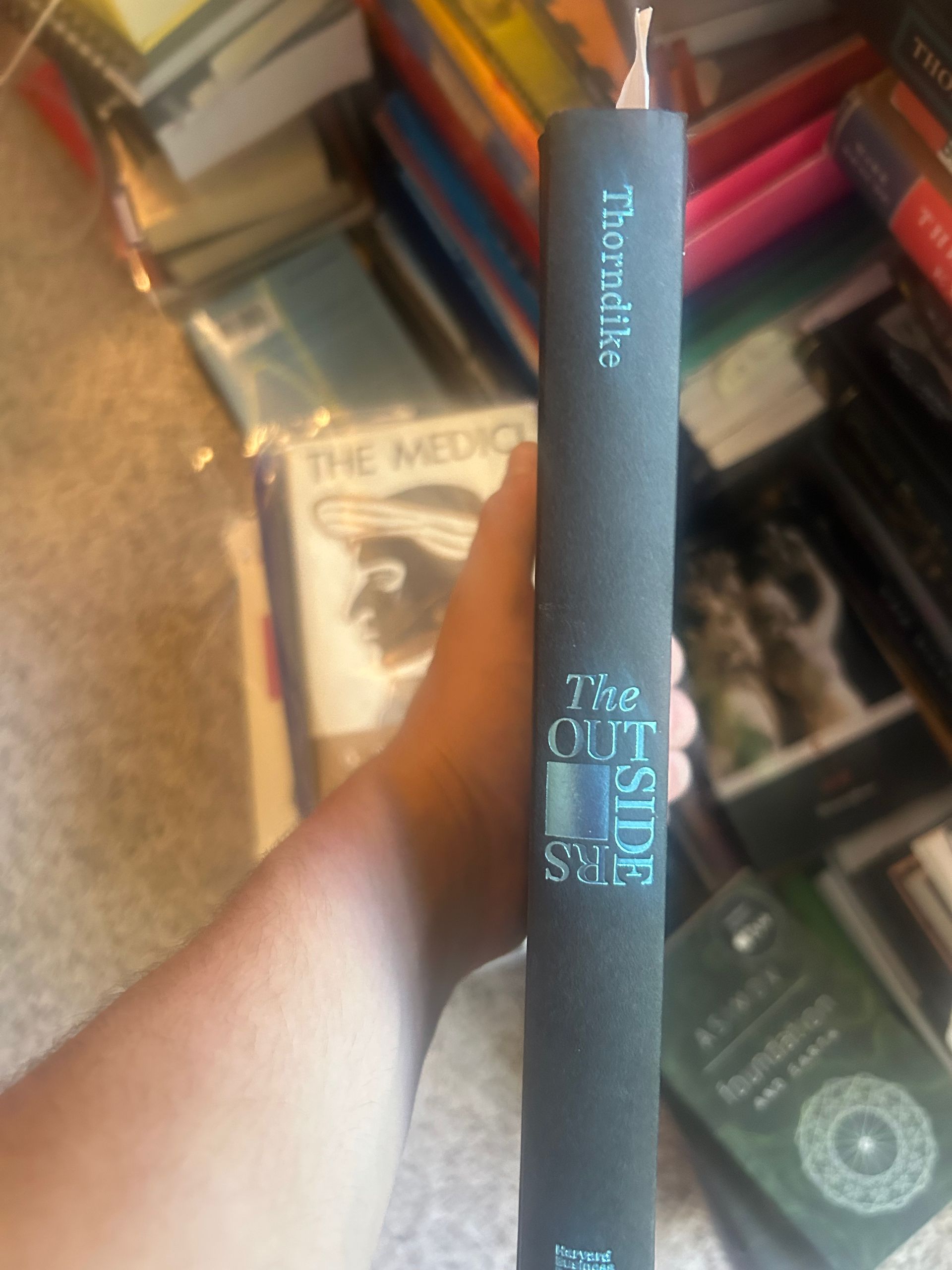- Noah Jacobs Blog
- Posts
- On Capex & Bootstrapping
On Capex & Bootstrapping
How losing a deal saved BirdDog tens of thousands of dollars a year.
2025.07.27
CX
[GAAP is Generous, Painting Half a Building, Death by a Thousand Cuts, Building an Asset vs Buying a Liability, Losing a Deal Saved Money, The Little Engine that Could]
Thesis: Viewing recurring costs like debt is a cultural building block that leads to long term compounding of your business.
[GAAP is Generous]
Looking back on our first year at BirdDog, one of the most surprising things to me is our extreme frugality.
In contrast to many funded environments I have seen from the outside and even operated in, the amount of cash BirdDog has brought in from customers is a much bigger number than all of the cash BirdDog has spent.
This has required what, in the startup world, would be seen as a super human vigilance around expenses. I give a lot of credit to Jack here; while I'm more constrained than many people I've seen, Jack's efficiency in capital allocation puts mine to shame.
The long term culture & norms of BirdDog are being both implicitly and explicitly defined right now, and I'm very optimistic that we are building a firm that is conscious about capital allocation to a much larger degree than most software companies.
Already, we’ve eschewed countless hundred & thousand dollar per year subscriptions to product and services that would make our lives easier. Most poignantly, we decided against using a particular $20K/yr SaaS in favor of building it ourselves.
I think the crux of the discrepancy boils down to two peculiar beliefs:
We view any recurring expense as a liability
We view the time involved to 'build' in a build vs buy debate as an investment
In other words, in a lot of cases, we don’t view the issue as a question build vs buy; we view it as a question of build an asset or buy a liability.
We're really optimistic about how this belief compound overtime, both financially and technically.
[Painting Half a Building]
To see historic precedent around the long term impact of frugality, you could read The Outsiders by Thorndike, a book illustrating that a lot of CEOs who drove incredible returns were very cost conscious.
As an example, Tom Murphy, CEO of Capital Cities, outperformed the market by 16x and his peer group by almost 4x over a 25 year period. This is some serious alpha.
One of the factors in his success is that he was extremely frugal.

I’ve only just begun, but it’s already a very good read
There's a story of a manager wanting to paint a studio that Capital Cities owned; Murphy pushed back. The manager said it was going to help advertisers take them more seriously & drive more revenue, so Murphy finally conceded… but, he made sure the manager only painted the half of the building facing the road!
A decision like that may seem extreme, but it was a culture of those decisions that put him in a position to buy ABC. More importantly than the acquisition itself was Murphy’s ability to leverage that oh so frugal culture of Capital Cities to greatly improve margins at ABC while still boosting ABC's rankings and performance.
[Death by a Thousand Cuts]
There is this funny notion when building a software company that one more recurring expense won't make you go broke.
That statement is certainly true, one subscription won’t make you go broke. But, the habit of adding one more subscription will.
What you do is who you are.
When I went to set up BirdDog's documentation, I examined the site of one of our competitors for ideas. I saw that they were paying $150-$550/mo to another software company to host their documentation and make it look pretty.
To a company that raised tens of millions, adding a few thousands of dollars in expenses a year probably feels like nothing.
To us, though, that's an outlandish use of capital.
This is especially true when making our docs without paying for someone else’s software would take maybe an hour or two more than making the docs with their software. (All it took was cloning a public repo, configuring it, and setting up some github actions for deployment)
[Building an Asset vs Buying a Liability]
You might say: "But Noah, you need to be acting like you're worth AT LEAST $150 / hour if you're founding a company! Therefore, you should just purchase the subscription and forget it."
I do think you should treat your time as if it's worth more than it is to help make better decisions. The challenge, though, is that this really isn't a $150 decision. It's a $150/mo decision, which is very different!
Even though technically you’d probably classify that subscription as an Operating Expense (OpEx), really, in our minds at BirdDog, it's a lot closer to a liability.
That's a liability!
You owe $150/mo in interest (subscription fee) until you pay down the principal (build it yourself)… if you ever even get around to it…
The good news is that the opposite of a liability is an asset. So, if that purchases is like taking on a liability, than building it out yourself is like investing in an asset!
While it's not something that you can put on your balance sheet, it's definitely increasing the value of your business—otherwise, you'd never consider spending $150/mo on it in the first place!
Even if it is marginal, increasing the value of your business is, well, typically your main goal when running a business.
That’s why build vs buy is, a lot of the time, actually a question of building an asset vs buying a liability.
[Losing a Deal Saved Money]
Maybe the $1600 example isn't enough to convince you. Well, we made the same build decision recently for a $20K per year subscription.
We had a certain deal on the line that would require integrating with our prospect’s CRM. After we closed the prospect, we were intending using some of that cash flow to purchase a subscription to a software service that would make the integration very easy.
The first year, the subscription would be $20K; the next year, it would be at least $30K, if not higher!
Unfortunately, that deal fell through.
Fortunately, when it did, we decided to try and build out the integrations ourselves.
And, we did it. Turns out, it wasn't actually so hard.
The funny thing is that I let myself get convinced that the $20K price tag was worth it because of all the complexity it would handle. And, in some scenarios, it might be worth it.
For us, though, there really isn't that much complexity or volume involved in it yet. So, now's not the time to buy. Even as the complexity and volume grow, it will likely still make more sense to iterate on our own solution than to buy the out of the box one.
And to further drive the point home that this subscription really would’ve been a liability, our ability to deliver the service to the prospect would be contingent on us a) continuing to pay the fee or b) spending the engineering effort to build out our own solution. Once we started, there would be no way out except for spending more human or financial capital.
The lesson is, in a lot more situations than you think, you really can just build it!*
*A trick I used was to have an LLM find the right documentation & examples to help me, rather than using a search engine where all of the valuable information is hidden by advertisements for managed services disguised as “guides”
If you like this post, subscribe to stay up to date; I send one out every Sunday morning!
[The Little Engine that Could]
The goal is not to have the longest train, but to arrive at the station first using the least fuel.
Jack & I fully believe that continuing to make frugal and cost conscious decisions about what we spend capital on will compound in the long term, both financially & culturally.
Beyond that, there is a whole other level of value around understanding & owning our own code & systems.
In the late 20th century, US Manufactures were allured allured by cheap offshore costs. Ultimately, that eroded our technical edge! I think software companies are having a similar moment.
When you manufacture something, you learn how to make it better… When design and manufacturing are far apart, iteration slows and quality suffers.
If you view code as a commodity that has downward price pressure due to gen ai, why invest in building it yourself when you can just pay someone else $100/mo for a bunch of different micro services?
Well, making a habit of buying those things not only harms your margins & puts you in an increasingly dependent position, it might also cripple your long term ability to make good stuff on your own!
Bringing it full circle to Tom Murphy—the ability to create a culture of competence and frugality is more valuable than the frugality itself; you get to leverage it for multiplicative effects later. Just look at the value he created by spreading his culture & knowhow to ABC.
Live Deeply,
